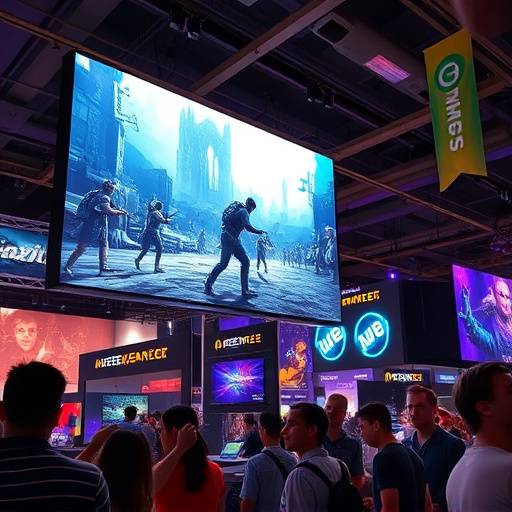Gaming as a Tool for Education
Engaging Learners Through Play
Educational games are transforming the way students learn, providing engaging and interactive experiences that make complex subjects accessible and enjoyable. From history simulations to math puzzles, games offer a powerful way to reinforce concepts and develop critical thinking skills.
At Pixel Pioneers, we believe in the power of game-based learning. We partner with educators and developers in San Francisco to create innovative educational games that align with curriculum standards and cater to diverse learning styles. Our flagship project, "EcoQuest," is a simulation game that teaches students about environmental science and sustainable practices.
Dr. Evelyn Reed, an education technology specialist at the San Francisco Unified School District, emphasizes the benefits of using games in the classroom. "Games provide a safe and stimulating environment for students to experiment, make mistakes, and learn from their experiences," she says. "They also foster collaboration, problem-solving, and a love of learning."
One of the key advantages of educational games is their ability to personalize the learning experience. Adaptive learning technologies can tailor the difficulty level and content to meet the individual needs of each student, ensuring that they are challenged but not overwhelmed. This personalized approach can lead to improved academic outcomes and increased student engagement.
Explore games like "Minecraft: Education Edition," used to teach everything from coding to history, and "Kerbal Space Program," which introduces physics and engineering concepts in a fun, hands-on way. The possibilities are endless, and the future of education is being shaped by the innovative use of gaming technology.
Learn More About Our Educational Initiatives
Gaming for Health and Well-being

Improving Lives Through Interactive Technology
Gaming is increasingly being used in healthcare to improve patient outcomes, enhance rehabilitation, and promote mental well-being. Exergames, which combine exercise with gaming, can help patients recover from injuries, manage chronic conditions, and stay active. Virtual reality (VR) games are being used to treat phobias, reduce pain, and provide therapeutic experiences.
At Pixel Pioneers, we are committed to developing and supporting healthcare gaming initiatives. We partner with hospitals and clinics in the Bay Area to implement gaming-based therapies and conduct research on their effectiveness. Our "RehabQuest" project uses VR technology to create immersive rehabilitation experiences for stroke patients.
Dr. Marcus Chen, a rehabilitation specialist at UCSF Medical Center, highlights the potential of gaming in healthcare. "Gaming can make rehabilitation more engaging and motivating for patients," he says. "It can also provide objective data on patient progress, allowing us to tailor treatment plans more effectively."
The use of gaming in mental healthcare is also gaining traction. Games can provide a safe and supportive environment for individuals to explore their emotions, develop coping skills, and connect with others. Online games can also help reduce social isolation and improve overall well-being.
Consider "EndeavorRx," the first video game approved by the FDA as a treatment for ADHD in children. This innovative game demonstrates the potential of gaming to address significant healthcare challenges and improve the lives of patients worldwide.
Discover Our Healthcare Gaming ProgramsThe Cultural Influence of Gaming

Shaping Trends: Gaming's Impact on Society
Gaming has become a dominant force in popular culture, influencing music, movies, fashion, and art. Video game characters and storylines are often referenced in other forms of media, and gaming conventions attract millions of attendees worldwide. The cultural impact of gaming is undeniable and continues to grow.
Esports, in particular, has exploded in popularity, with professional gamers becoming celebrities and tournaments attracting massive viewership. The rise of streaming platforms like Twitch has further amplified the cultural influence of gaming, allowing players to connect with audiences and build communities around their favorite games.
The Bay Area is at the forefront of the gaming industry, with numerous game development studios, esports teams, and gaming communities based in the region. Pixel Pioneers is proud to be a part of this vibrant ecosystem and to contribute to the cultural impact of gaming.
Moreover, gaming has influenced language and communication, with new terms and phrases originating from online gaming communities becoming part of everyday vocabulary. The interactive and social nature of gaming has also fostered new forms of digital expression and creativity.
Dr. Serena Patel, a cultural anthropologist at UC Berkeley, notes that "Gaming has become a shared cultural experience for millions of people around the world. It provides a sense of community, fosters creativity, and shapes our understanding of the world around us."
Explore Our Cultural Gaming Projects
Gaming for Social Change and Activism
Using Games to Advocate for Important Issues
Gaming is emerging as a powerful tool for social change and activism, allowing players to explore complex issues, challenge societal norms, and advocate for positive change. Games can raise awareness about important topics, promote empathy, and inspire action.
At Pixel Pioneers, we support game developers and activists who are using games to address social and environmental issues. We provide funding, mentorship, and resources to help them create impactful games that make a difference. Our "ChangeMakers" program supports projects that promote social justice, environmental sustainability, and global peace.
Professor Lena Ramirez, a media studies scholar at Stanford University, emphasizes the potential of gaming as a form of activism. "Games can provide a unique and immersive platform for engaging with complex social issues," she says. "They can also foster dialogue, challenge assumptions, and empower players to take action."
Games like "Papers, Please," which explores the ethical dilemmas faced by border control officers, and "This War of Mine," which depicts the struggles of civilians in a war-torn city, demonstrate the power of games to evoke empathy and raise awareness about important social issues.
"That Dragon, Cancer," an autobiographical game about a family's experience with their son's cancer diagnosis, has been lauded for its emotional honesty and ability to connect with players on a deeply personal level. Games can be incredibly effective at communicating difficult or sensitive topics that might otherwise be difficult to discuss.
Support Our Social Change Initiatives